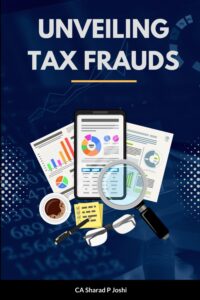In this exclusive interview, we dive into the intricate realm of tax frauds in India with CA Sharad Joshi, a distinguished expert in taxation and the author of the enlightening book, “Unveiling the Tax Frauds.” He is also an early investor in Riskpro.
We sit down with CA Sharad P Joshi, a seasoned taxation expert and the author of “Unveiling the Tax Frauds,” a book now adopted as study material for the global Certified Tax Fraud Analyst course. In this exclusive interview, we delve into the world of tax frauds in India, exploring trends, challenges, and insights shared by one of the leading authorities in the field.
Question: Can you shed light on the current landscape of tax frauds in India?
Answer: Tax frauds in India are evolving into more sophisticated schemes. Exploiting weaknesses in the system, fraudsters engage in deceptive practices such as underreporting income, exaggerating expenses, and misclassifying transactions. These fraudulent activities primarily fall into two categories: those committed by taxpayers themselves and those orchestrated by tax return preparers. In cases where the taxpayer is the perpetrator, there is at least an awareness of the risks involved. However, when tax fraud occurs without the taxpayer’s knowledge, the associated risks escalate significantly.
What are the common trends you’ve observed in tax frauds over the years?
Answer: There is a clear trend towards utilizing digital platforms for engaging in tax fraud. Emerging practices include manipulating digital records, employing intricate structures to conceal income, and taking advantage of gaps in tax legislation. It is crucial for regulators to adjust their strategies to counter these evolving tactics.
For individuals taxed on their income, especially salaried professionals, there is a risk of fraudulent claims for expenses like medical or housing allowances, or any available exemptions in respective countries. On the corporate front, taxation has become more intricate due to factors such as related parties, complex structures, mergers and acquisitions, and international transfers.
How can individuals protect themselves from falling victim to tax frauds?
Answer: Education is key. Individuals should be aware of common red flags, scrutinize their financial transactions, and keep abreast of changes in tax regulations. Seeking professional advice and maintaining transparent financial records can act as strong deterrents against fraud.
 Question: In your book, you discuss the role of technology in tax frauds. Could you elaborate on this aspect?
Question: In your book, you discuss the role of technology in tax frauds. Could you elaborate on this aspect?
Answer: Technology has both facilitated and complicated tax fraud. While digital platforms ease transactions, they also provide opportunities for manipulation. From fake invoices to identity theft, fraudsters exploit technology. Authorities must harness tech advancements for robust fraud detection mechanisms.
Question: Are there specific sectors more prone to tax frauds?
Answer: While traditionally vulnerable sectors such as real estate and cash-intensive businesses have historically faced susceptibility to fraud, the landscape has significantly shifted with the widespread digitalization of transactions. Fraud risks are now pervasive across various industries.
It is imperative to adopt a comprehensive and sector-specific regulatory and enforcement approach to address these challenges effectively. It’s worth noting that my book is not limited to any one country; it delves into tax frauds across diverse global economies, providing comparative analysis and common sizing of fraudulent activities.
Question: How does your book address the challenges faced by tax authorities in tackling fraud?
Answer: “Unveiling the Tax Frauds” discusses the challenges faced by tax authorities, emphasizing the need for technological upgrades, enhanced collaboration, and a proactive approach. It advocates for a robust regulatory framework that evolves with the changing landscape.
Question: Can you share insights on the impact of globalization on tax frauds in India?
Answer: Globalization has opened new avenues for tax fraud, with cross-border transactions creating complexities. Coordinated efforts between nations are crucial to combat international tax evasion. The book explores the nuances of these challenges and proposes solutions.
Question: What role do whistleblowers play in exposing tax frauds, and how can the system encourage their participation?
Answer: Whistleblowers are instrumental in uncovering tax frauds. Establishing protective mechanisms, ensuring anonymity, and providing incentives can encourage more individuals to come forward. Their role is pivotal in maintaining the integrity of the tax system.
Question: How can businesses contribute to the fight against tax frauds?
Answer: Businesses must prioritize ethical practices, implement robust internal controls, and invest in compliance measures. Collaboration with tax authorities, transparent reporting, and a commitment to fair taxation are integral in curbing fraud.
Question: What do you envision for the future of tax fraud prevention in India?
Answer: The future demands a holistic approach, combining technological advancements, regulatory reforms, and public awareness. A proactive stance from authorities and taxpayers alike will be paramount in building a resilient defense against evolving tax fraud trends.
CA Sharad P Joshi’s insights provide a comprehensive understanding of tax frauds in India, emphasizing the collective responsibility of individuals, businesses, and authorities in fostering a transparent and fraud-resistant tax ecosystem.



